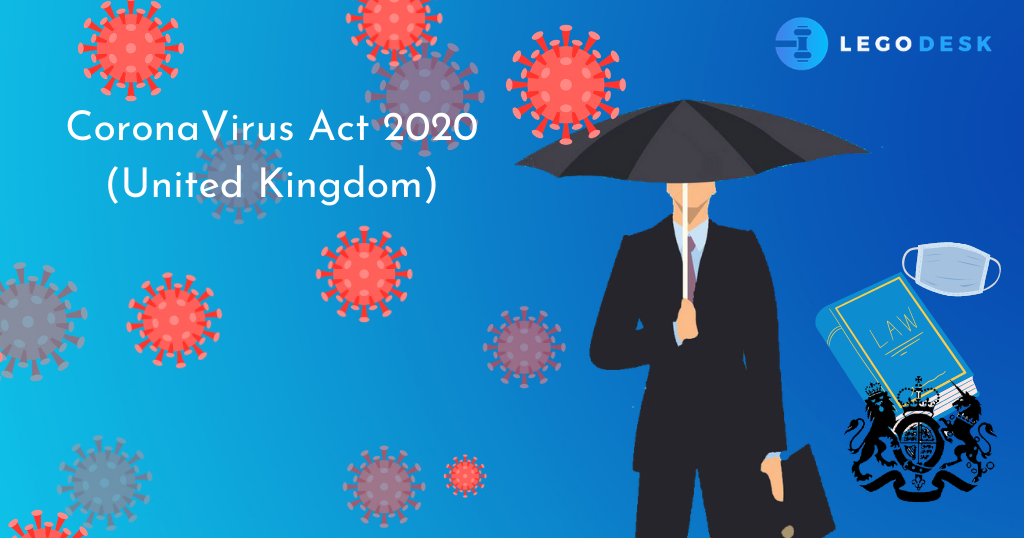Coronavirus Act 2020 (United Kingdom)
Coronavirus Act of 2020 is an act of the United Kingdom Parliament which states that they allow the government’s emergency powers to take care of the COVID-19 pandemic. The Act covers a very large range of topics directly and indirectly affected by the coronavirus.
This Act was passed very quickly with very little parliamentary objections. The laws which are found in the coronavirus Act 2020 are
- C 22, the Health Protection (Coronavirus) Regulations 2020 and the Health Protection (Coronavirus Restrictions) (England) Regulations 2020.
- The Local Authorities and Police and Crime Panels (Coronavirus)
- The flexibility of Local Authority and Police and Crime Panel Meetings (England and Wales) Regulations 2020
- Response by Government to Home Affairs Select Committee Report into COVID-19 and Policing.

5 aims of the Act:
- Supporting the vulnerable people; those who are 60 and older with health problems, pregnant ladies and children.
- To increase the health and social care work people.
- Help in easing the work of immediate workers.
- To contain and slow down the spread of the virus.
- Managing the dead ones with respect and giving them to their families from the hospitals.
Four nations becoming one
The United Kingdom is one single international land, but it is made up of four nations. England, Scotland, Wales, and Northern Ireland. We live in an age of decentralization, and the methods of the health law are quite different in all four nations. Therefore, people are worrying to take care of the United Kingdom law for this 2020 act of coronavirus.
Read Also – Article 47 of the Indian Constitution
They are respecting the transfer of the government’s power to the lower houses, as the virus does not limit the national and geographical boundaries.
How long will this act stay?
The coronavirus act has an ending clause; which says that it will end after two years, but the state can stretch or shorten this period, and there are no exceptions. The people have to be careful. In the past, many of the wartime laws and terrorist laws were to be temporary, but it might continue in a post-covid world as well.
The secretary of the state has to keep reviewing the coronavirus pandemic regulations every 21 days. 15 days in respect of the businesses selling food and drinks in the work place; to protect to risks of public health and to ban the public meetings of more than two people.
Read Also – Financial Emergency in India
Emergency registration
- Many people are coming in to help, returning care takers, retired workers, new workers. For example; health professionals, doctors, nurses, pharmacists, social workers and volunteers, facilities is made for emergency simple registration with the governor.
The compensation
- Extended compensation cover for the people harmed by the ignorance of the clinical staff taking care of the COVID-19 patients.
Mental health medical health for the mental health patients will be delaying or postponed.
Read Also – Recession Proofing Your Legal Practice
Public Health protection
Not following the rules is a criminal offence. The police power has increased. the police is allowed to use reasonable force. extended warrants are also available. An infected person threatening to cough on a police officer is also a serious offence.
The rules and regulations of the coronavirus act has to be largely expressed in very general terms, with the unavoidable truth; and surrender to the powers of the police. The common English law has always been that the citizen can do anything as long as its under the law.
With the COVID infecting people it is potentially a serious threat to public health; the police will be directing isolation and screening and even restricting events and gatherings.
Read Also – Article 352 of the Indian Constitution Talks About National Emergency
Criticisms
In the times of difficulty and stress, the medical staff very openly criticize the government and the administrators in some hard times. For example, , shortage of personal equipments, testing equipments, ventilators etc.
Raising concerns like these will automatically be dismissed because this is not the right way to do it. Instead, the employer’s procedure is to be followed in an acceptable manner; going to the complaints officer.
Read Also – “Virtual Courts Soon”, Says Supreme Court Judge Due to Corona Virus in India.
Conclusion
Even when the pandemic is over, the long-term effects are most likely to be serious. National morale can be low. The economy will have been seriously damaged. Through death and illness, the medical profession at every level will be crushed. The flow of foreign staff will be less than previously. The situation is unlikely to be back to normal before the 2020–2021. The health requirements will differ due to differing social and economic geographical conditions.
Though police suppression is a poor weapon for health protection. The people are content for the moment to support the Government. The real change has been the recognition that much more dependence will need to be placed on the experts and on the civil work, who understand the situation better than the politicians, who will be able to think ahead, more constructively, and promote better preparedness.